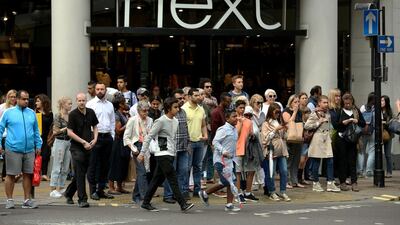The past few days have brought figures on the economic front that must make even the most optimistic of us pause. There are now clear signs that the US economic recovery is running out of steam, with only 160,000 new jobs created last month, well down on the 200,000 widely expected. The widely expected rise in US interest rates in June, designed to rein in the prospect of inflation, now looks unlikely.
That by itself is not too gloomy: the US unemployment rate is stuck at about 5 per cent, which when I studied economics a long time ago was regarded as full employment, and an awful lot of finance ministers around the world, not least those of Spain and Greece, would give their right arms for these kind of figures. South Africa, where I spend a lot of time and where I am writing from, yesterday announced that the official level of unemployment edged up to nearly 25 per cent, but in reality, taking into account all those who don’t even bother to apply for jobs any more, the true figure is at least 35 per cent – a potentially disastrous level in an economy where so many live at or below the bread line.
The latest US statistics chime with a number of other indicators suggesting the economy has lost momentum in the early months of this year, bolstering the case for the Federal Reserve (or more precisely, the federal open market committee) to wait before lifting rates again as it assesses the economic soft patch.
The US grew at an annualised rate of just 0.5 per cent in the first quarter and early indicators for the second quarter are also mixed.
The senior economist Stuart Hoffman of PNC Financial was quoted as saying over the weekend: “A rate hike delay until July or even September is warranted to give the Fed more time to determine if there is a solid acceleration in real GDP growth, workers’ wages, and both faster headline … and core inflation this spring and summer.”
That was not his expectation even a few weeks ago. The economic clouds are beginning to gather, not least in Britain as it approaches the crucial Brexit referendum.
The financial commentator Jeremy Warner, whose views I have a great deal of respect for, wrote in his Sunday Telegraph column that: “A significant slowdown is taking place in the UK economy; that much is plain not just from the growing weight of anecdotal evidence – including warnings from a whole slew of retailers – but from the now unmistakable softness in the official data.”
For the first time in years, the UK economy grew more slowly than the eurozone in the first quarter, with the Brexit uncertainty, which should not be underestimated, at least partly responsible.
Business confidence, according to a recent survey by Deloitte, is at its lowest level since the eurozone crisis six years ago and the Bank of England has cited growing evidence that capital expenditure and commercial property transactions are being postponed pending the vote on June 23.
But even allowing for Brexit, the prognosis is not encouraging. Britain’s economic recovery, however anaemic by past standards, is now 13 quarters long, not record breaking by the standards of the famous “Lawson boom” of the 1980s, or that of Gordon Brown, but getting on that way.
It has largely been consumption driven, helped by record levels of employment, historically low interest rates and low oil prices. But in recent weeks we have seen a series of warnings from some of the biggest retail chains indicating that the retail boom is at an end: Simon Wolfson of Next, one of the darlings of the retail industry for the past dozen years, has shaken the markets with a profit warning and a growing number of his competitors have followed.
The eurozone, oddly enough, has been a brighter spot this year but only as a result of the biggest monetary stimulus in its history, and that doesn’t impress anyone. There is nothing yet that is self-sustaining about its recovery. As Warner remarked over the weekend: “Any stumble, and the eurozone crisis will be back before we know it.”
There is not much comfort on the wider economic scene either. The emerging-market crisis, which was largely responsible for the international panic in January, has subsided but the fundamentals have not changed – South Africa narrowly avoided a ratings downgrade by Moody’s at the end of last week, but Standard & Poor’s and Fitch will still have their say. And the Chinese economy remains as delicately poised as ever.
None if this is catastrophic – just warning signs that the economic recovery is stalled even before it ever properly got going. And there are some bright spots to cheer us up: the oil price, which dipped below US$30 a barrel in January, has since recovered by 60 per cent, partly because of the huge blaze in Canada, which has curtailed production, and commodity prices too have staged a recovery.
The biggest worry must be the British economy, where the polls are tilting ominously in favour of an Out vote. Logically and emotionally that may be the right thing for Britain – I certainly think so – but the economic consequences in the short term would be horrible. And it won’t take much to tip it back into recession.
Ivan Fallon is a former business editor of The Sunday Times

